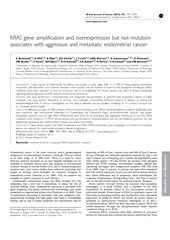| dc.contributor.author | Birkeland, Even | en_US |
| dc.contributor.author | Wik, Elisabeth | en_US |
| dc.contributor.author | Mjøs, Siv | en_US |
| dc.contributor.author | Høivik, Erling Andre | en_US |
| dc.contributor.author | Trovik, Jone | en_US |
| dc.contributor.author | Werner, Henrica Maria Johanna | en_US |
| dc.contributor.author | Kusonmano, Kanthida | en_US |
| dc.contributor.author | Petersen, Kjell | en_US |
| dc.contributor.author | Ræder, Maria B. | en_US |
| dc.contributor.author | Holst, Frederik | en_US |
| dc.contributor.author | Øyan, Anne Margrete | en_US |
| dc.contributor.author | Kalland, Karl-Henning | en_US |
| dc.contributor.author | Akslen, Lars A. | en_US |
| dc.contributor.author | Simon, Ronald | en_US |
| dc.contributor.author | Krakstad, Camilla | en_US |
| dc.contributor.author | Salvesen, Helga Birgitte | en_US |
| dc.date.accessioned | 2014-01-14T12:47:35Z | |
| dc.date.available | 2014-01-14T12:47:35Z | |
| dc.date.issued | 2012 | eng |
| dc.Published | British Journal of Cancer 107(12): 1997–2004 | eng |
| dc.identifier.issn | 1532-1827 | |
| dc.identifier.issn | 0007-0920 | |
| dc.identifier.other | http://www.nature.com/bjc/journal/v107/n12/full/bjc2012477a.html | eng |
| dc.identifier.uri | https://hdl.handle.net/1956/7671 | |
| dc.description.abstract | BACKGROUND: Three quarter of endometrial carcinomas are treated at early stage. Still, 15 to 20% of these patients experience recurrence, with little effect from systemic therapies. Homo sapiens v-Ki-ras2 Kirsten rat sarcoma viral oncogenes homologue (KRAS) mutations have been reported to have an important role in tumorigenesis for human cancers, but there is limited knowledge regarding clinical relevance of KRAS status in endometrial carcinomas. METHODS: We have performed a comprehensive and integrated characterisation of genome-wide expression related to KRAS mutations and copy-number alterations in primary- and metastatic endometrial carcinoma lesions in relation to clinical and histopathological data. A primary investigation set and clinical validation set was applied, consisting of 414 primary tumours and 61 metastatic lesions totally. RESULTS: Amplification and gain of KRAS present in 3% of the primary lesions and 18% of metastatic lesions correlated significantly with poor outcome, high International Federation of Gynaecology and Obstetrics stage, non-endometrioid subtype, high grade, aneuploidy, receptor loss and high KRAS mRNA levels, also found to be associated with aggressive phenotype. In contrast, KRAS mutations were present in 14.7% of primary lesions with no increase in metastatic lesions, and did not influence outcome, but was significantly associated with endometrioid subtype, low grade and obesity. CONCLUSION: These results support that KRAS amplification and KRAS mRNA expression, both increasing from primary to metastatic lesions, are relevant for endometrial carcinoma disease progression. | en_US |
| dc.language.iso | eng | eng |
| dc.publisher | Cancer Research UK and Nature Publishing Group | eng |
| dc.relation.ispartof | <a href="http://hdl.handle.net/1956/7673" target="blank">Mutations and gene amplifications in Endometrial Carcinomas. “Clinical characteristics and potential targets for therapy related to KRAS, MYC, ATAD2, PIK3CA and FGFR2 alterations”</a> | eng |
| dc.rights | Attribution-NonCommercial-ShareAlike CC BY-NC-SA | eng |
| dc.rights.uri | http://creativecommons.org/licenses/by-nc-sa/3.0/ | eng |
| dc.subject | Endometrial cancer | eng |
| dc.subject | Prognosis | eng |
| dc.subject | KRAS | eng |
| dc.subject | Amplification | eng |
| dc.subject | Mutation | eng |
| dc.title | KRAS gene amplification and overexpression but not mutation associates with aggressive and metastatic endometrial cancer | en_US |
| dc.type | Peer reviewed | |
| dc.type | Journal article | |
| dc.description.version | publishedVersion | en_US |
| dc.rights.holder | Copyright 2012 Cancer Research UK | |
| dc.identifier.cristin | 1001408 | |
| dc.source.journal | British Journal of Cancer | |
| dc.source.40 | 107 | |
| dc.source.14 | 12 | |
| dc.source.pagenumber | 1997-2004 | |

